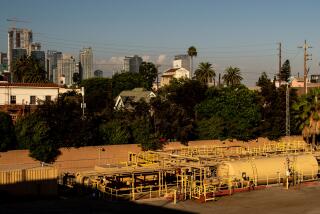Former Arco Chief Still Gambling on Oil Strikes : Energy: Facing hard times, Robert O. Anderson insists his Hondo Oil & Gas will bounce back, and he has no intention of ‘hanging up his spurs.’
- Share via
In 1967, seven dry holes on Alaska’s harsh North Slope had left Atlantic Richfield Chairman Robert O. Anderson facing a costly choice. Should he try one more? The consummate wildcatter, Anderson pushed ahead, making one of the strategic decisions in U.S. oil history.
The day after Christmas, oil historian Daniel Yergin recounts, a sound like four jumbo jets flying just overhead announced a plume of spewing natural gas. Prudhoe Bay turned out to be the largest petroleum discovery ever in North America.
Now Anderson, 76, is facing perhaps his greatest gamble since.
His beleaguered Hondo Oil & Gas Co., the firm Anderson built after retiring from Arco in 1986, has placed its hopes on a single wildcat well in the jungles of Colombia. The preoccupation of his active retirement, Hondo has been bleeding money for years--although Anderson insists “things are going well for the company” with the sale last week of its Carson refinery.
And in a blow that falls closer to home, Anderson and his wife, Barbara Phelps Anderson, face a $6.3-million lawsuit over past-due personal loans. Citibank wants to foreclose on the couple’s New Mexico cattle ranch and home and confiscate Anderson’s Arco pension to pay off the debt.
“Personally, I admire Mr. Anderson for what he’s done in the past, and it’s unfortunate we have to do this,” said Perry Pakravan, a vice president of Citicorp North America who supervises the Anderson loans.
Pakravan says the bank hopes a settlement can be reached before the matter goes to court. “We are on talking terms,” he said, “and I think Mr. Anderson is doing what he can.”
In a series of phone interviews Monday, Anderson declined to comment on the dispute.
Anderson is a respected and familiar figure in Southern California business and civic circles. The Robert O. Anderson Building houses modern and contemporary art at the Los Angeles County Museum of Art. He has supported groups ranging from the environmentalist Worldwatch Institute in Washington to the Aspin Institute for Humanistic Studies, which he transformed into an influential international policy forum.
“Through imagination and luck, he built a hell of a company in Arco, one of the best to emerge in the last oil boom,” said J. Robinson West, president and CEO of Petroleum Finance Co., a Washington-based consulting firm.
Anderson’s personal wealth was estimated by Forbes magazine at $200 million in 1985, when he was still running Arco, the Los Angeles-based petroleum company he was largely responsible for forming two decades before. Post-Arco, some oil analysts estimated that Anderson made $12.5 million on the rising price of oil the day U.S. troops began to retake Kuwait.
After leaving Arco, he returned to his roots in the petroleum business--to wildcatting, the high-stakes gamble of drilling where no wells have been drilled before. In 1986 and ‘87, Anderson bought the assets that would become Hondo.
But the going has been rough. “Both oil and gas prices crashed just when he took over the company,” West said, “and he’s held it through one of the most difficult periods in the U.S. oil industry.”
Anderson and a British partner--controversial financier R.W. (Tiny) Rowland and hisLonrho Inc.--bought producing oil and gas wells primarily in New Mexico and Texas and two refineries in Los Angeles.
From the beginning, the refining operations absorbed much of the cash flow from the producing wells and drove Hondo deeper into debt--mostly to Lonrho.
The refineries “were smallish and couldn’t compete,” said Greg L. McMichael of Hanifen & Imhoff Inc., Denver-based institutional investment bankers. “They ended up draining a lot of money out of the company.”
One refinery, in Newhall, eventually was dismantled. Hondo’s marginal Fletcher refinery in Carson went in and out of production while Hondo sought a buyer, finally being idled indefinitely last October. The previous June, Hondo had sold virtually all its U.S. crude oil and natural gas properties--mainly the cash-producing New Mexico and Texas fields--to Devon Energy Corp. for slightly more than $139 million.
“It was a desperate sale of assets for Hondo,” McMichael said. Hondo was saddled with $66 million in long-term debt as of June this year.
Meanwhile, Anderson’s ranching operation has dwindled in recent years, though he declines to say how much is left of what was once estimated at 120,000 acres of prime New Mexico rangeland.
“Over the last 15 years,” he acknowledged Monday, “I have been slowly disposing of ranch property.”
Now Hondo and Anderson have virtually all their chips bet on a potential natural gas field in the Colombia’s Magdalena Basin.
It’s a technically complex, difficult place to drill, and Hondo’s first deep exploratory well was an estimated $10-million loss. Last March, the drill pipe broke off in the hole; work at the site has been suspended indefinitely.
Amoco Corp. has stepped in to buy half the Magdalena project, bringing $12 million to fund another well. Drilling is to begin by Oct. 15. But with Colombia already taking half of any big discovery, Hondo’s share of any bonanza will be only about 15%.
“They’ll have to really have a big discovery to make any money,” McMichael said.
Even if that happens, the problems don’t necessarily end. “It’s by no means clear that a gas field of the magnitude Hondo is looking for down there would find a market,” McMichael said.
The Citicorp lawsuit, filed in rural Lincoln County, N.M., centers on personal loans totaling $9 million that the Andersons received in 1989 and ’90.
As of July 22, according to the suit, almost $4.8 million in principal and more than $1.6 million in interest remained “long past due.”
It remains unclear what connection, if any, exists between Hondo’s problems and the Andersons’ personal finances, although Hondo is named as a defendant as well. Hondo executive C. B. McDaniel said “they’re unrelated.” Citibank’s Pakravan declined to elaborate on the circumstances of the suit.
As to Hondo’s predicament, several industry veterans who declined to be named suggest that Anderson has simply remained in the volatile oil business too long. “Like George Bush said, there’s a time when people should get into grandchildren,” one observed. “Anderson should have known when to hang up his spurs.”
But Anderson isn’t ready to call it quits.
The former Newhall refinery site has local government approval to be sold as an office park, a deal that could bring $20 million to $30 million to Hondo.
And just Friday, the firm announced another asset sale, disposing of the troubled Fletcher refinery for an expected $2.5 million, booking a loss of $6.5 million on the transaction.
“To get rid of the refinery is a real breath of fresh air,” Anderson said.
Hondo’s Long Slide
Hondo Oil & GAs shares have plunged from more than $20 a share as recently as 1991 to $7.125 now, as the firm has continued to bleed red ink. Losses in 1991 and ’92 totaled $103 million, and so far this year the company has lost nearly $11 million.
Monthly closes, except latest
Monday: $7.125
Source: Valueline
More to Read
Sign up for Essential California
The most important California stories and recommendations in your inbox every morning.
You may occasionally receive promotional content from the Los Angeles Times.













